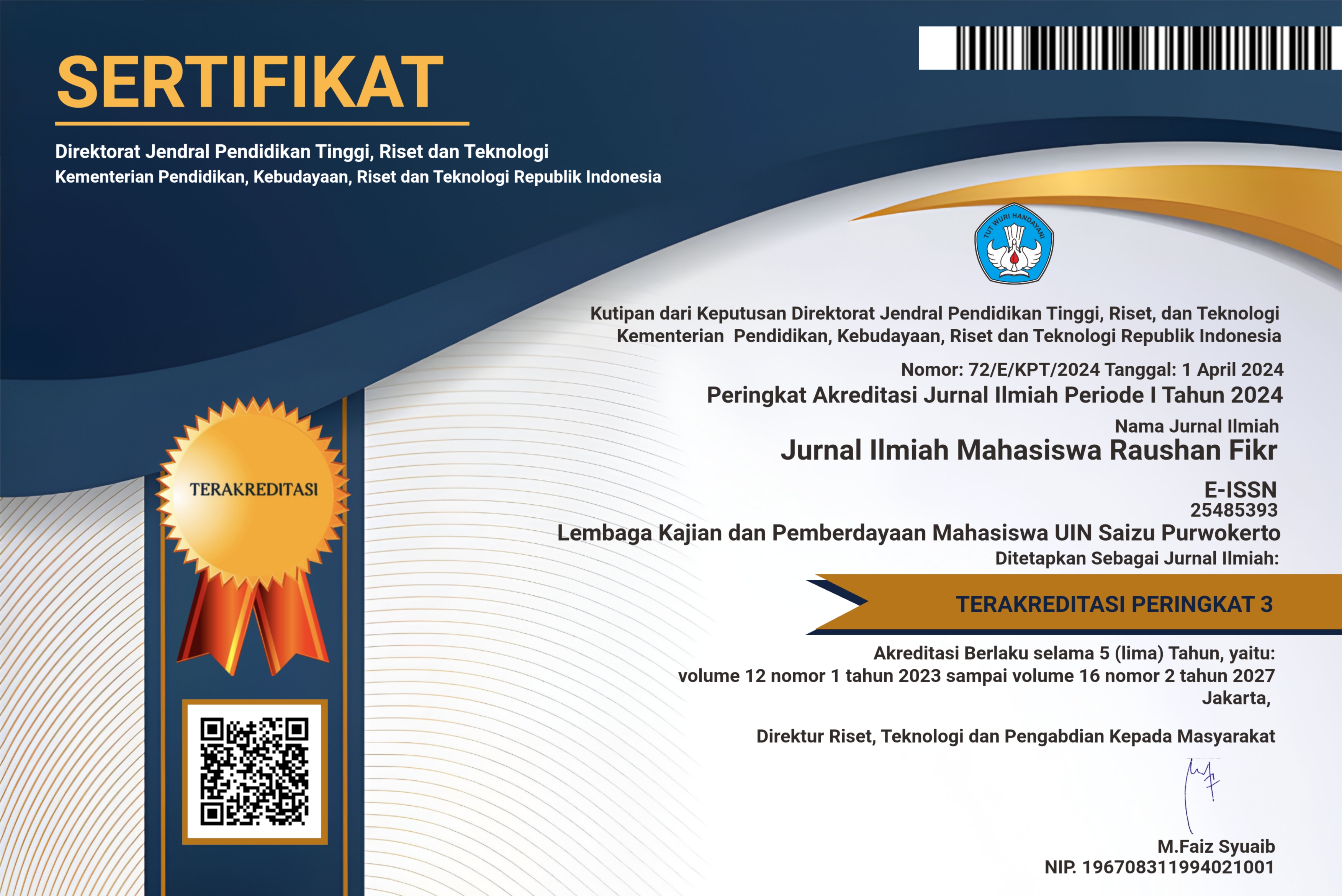Pembelajaran PAI Berbasis Bahasa Inggris Sebagai Upaya Menghadapi Tantangan Globalisasi di MI Afkaaruna Islamic School Yogyakarta
DOI:
https://doi.org/10.24090/jimrf.v10i1.4683Keywords:
pembelajaran PAI, pembelajaran berbasis bahasa Inggris, globalisasiAbstract
Today, society is faced with the phenomenon of globalization. This is immediately give demands that need more attention from all levels of society. The existence of globalization causes several challenges including self-defense to face global phenomena, self-readiness to face the era of competition, and readiness to improve self quality as a qualified human resource. It can be accomplished through educational reforms and creating new innovations in education. English-based Islamic Religious Education Learning is expected to be one of the way to prepare students to face the challenges of globalization. This research aims to find out how English-based learning of Islamic Religious Education is one of the way to face the challenges of globalization. The research is conducted on grade I students of MI Afkaaruna Islamic School Yogyakarta. This research used descriptive-qualitative research methode. The results of this study can be concluded that English-based Islamic religious education learning can be used as one of the way to prepare students to face the challenges of globalization because of the many benefits that are relevant as the solution for this matter.Downloads
References
Arifin, M. (2006). Ilmu Pendidikan Islam: Tinjauan Teoritis dan Praktis Berdasarkan Pendekatan Interdisipliner. Bumi Aksara.
Chaer, A. (2004). Sosio-linguistik: Perkenalan Awal. PT. Rineka Cipta.
Gunawan, S. (2019). Peranan Islam dalam Pembangunan Pradaban Dunia. Jurnal El-Qanuniy: Jurnal Ilmu-Ilmu Kesyariahan Dan Pranata Sosial, 5(1), 45–62. https://doi.org/10.24952/el-qonuniy.v5i1.1763
Haidar, P. (2012). Pendidikan Islam Dalam Sistem Pendidikan Nasional di Indonesia. Kencana Prenada Media Group.
Hawi, A. (2013). Kompetensi Guru Agama Islam. Raja Grafindo Persada.
Hidayat, N. S. (2012). Problematika Pembelajaran Bahasa Arab. An-Nida’, 37(1), 82–88. https://doi.org/10.24014/an-nida.v37i1.315
Khoirunnisa, A. (2018). Observed. Afkaaruna Islamic School.
Majid, A. (2014). Strategi Pembelajaran. Rosdakarya.
Mali, A. M. (1998). Visi Pembaharuan Pendidikan Islam. Lembaga Pengembangan Pendidikan dan Penyusunan Naskah Indonesia.
Moleong, L. J. (2005). Metodologi Penelitian Kualitatif. PT. Remaja Rosdakarya.
Mudjiono, & Dimyati. (2010). Belajar dan Pembelajaran. Rineka Cipta.
Muhaimin, Ghafir, A., & Rahman, N. A. (1996). Strategi Belajar Mengajar Penerapannya Dalam Pengembagan Pendidikan Agama. CV Citra Media Karya Anak Bangsa.
Mujiharto, S. M. (2018, March 7). [Personal communication].
Nurkencana, W., & Sumartana. (1986). Evaluasi Pendidikan. Usaha Nasional.
Pewangi, M. (2016). Tantangan Pendidikan Islam di Era Globalisasi. Tarbawi : Jurnal Pendidikan Agama Islam, 1(1), 1–11. https://doi.org/10.26618/jtw.v1i1.347
Sofia, A. (2013). Effective Strategy In Indonesian Language Learning For The Speakers Of Malaya-Patani, Thailand: Solution of Sosio-Historical Difference Between Indonesia and Thailand. Center For Teaching Staff Development.
Sugiono. (2008). Metode Penelitian Pendidikan (Pendekatan Kuantitatif, Kualitatif R&A. Alfabeta.
Syah, M. (1997). Psikologi Pendidikan dengan Pendekatan Baru. Rosdakarya.
Wibowo, E. N. (2020). Model Pengembangan Kurikulum Pendidikan Islam Berbasis Multikultural dalam Menghadapi Ujaran Kebencian (Studi Prodi PAI Pascasarjana IAIN Surakarta). Jurnal Ilmiah Mahasiswa Raushan Fikr, 9(2), 89–97.
Wijaya, I. K. (2015). Pembelajaran Bahasa Inggris di Sekolah Dasar. Bahtera : Jurnal Pendidikan Bahasa Dan Sastra, 14(2), 120–128. https://doi.org/10.21009/BAHTERA.142.02
Zulmy, B. (2020). Pendidik dalam Perspektif Al-Qur’an. Jurnal Ilmiah Mahasiswa Raushan Fikr, 9(2), 78–88.
Downloads
Published
How to Cite
Issue
Section
License
Authors who publish with this journal agree to the following terms:
- Authors retain copyright and grant the journal right of first publication with the work simultaneously licensed under a Creative Commons Attribution-NonCommercial-ShareAlike 4.0 International License that allows others to share the work with an acknowledgement of the work's authorship and initial publication in this journal.
- Authors are able to enter into separate, additional contractual arrangements for the non-exclusive distribution of the journal's published version of the work (e.g., post it to an institutional repository or publish it in a book), with an acknowledgement of its initial publication in this journal.
- Authors are permitted and encouraged to post their work online (e.g., in institutional repositories or on their website) prior to and during the submission process, as it can lead to productive exchanges, as well as earlier and greater citation of published work (See The Effect of Open Access).
















